Authors — Nicholas Rombes
-
The Blue Velvet Project, #53
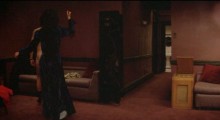
Second #2491, 41:31 “Get over there on that couch,” Dorothy says, and then follows Jeffrey (naked except for his black socks), knife raised, as if she would plunge it into his back were he to hesitate. The frame practically vibrates in anticipation of the coming of some dark force against which this tableau is nothing but a pale rehearsal. In Cinema 1: The Movement-Image, Gilles Deleuze writes that the frame is related to an angle of framing. This is because the closed set is itself an optical system which refers to a point of view on the set of parts. […]
by Nicholas Rombes on Dec 12, 2011 -
The Blue Velvet Project, #52
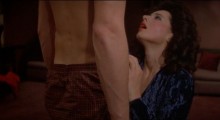
Second #2444, 40:44 The still frame, so much like a photograph that it takes a violent deformation of reality to make it move. Jeffrey and Dorothy, frozen eternally in a film that has stuttered to a stop. In John Ashbery’s long poem Girls on the Run, there are these lines: I’ll go you one better, Fred chimed in, here’s a diver, let’s call her Josephine, who dives and dives, further and downward, all our lives’ span, to the basis of that bridge. Dorothy and Jeffrey have taken the dive that trembles us into fear, and prevents us from following. So […]
by Nicholas Rombes on Dec 9, 2011 -
The Blue Velvet Project, #51
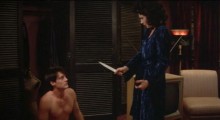
Second #51, 39:57 What is this world? Like piecing together a puzzle over an abyss, we are witnessing the scene of a crime conveyed in secret code. We know, of course, that Dorothy will not kill Jeffrey, but somehow this fact only makes matters worse. The murderers and the murdered. In her never-out-of-date book Window Shopping: Cinema and the Postmodern, Anne Friedberg writes that as soon as the photographic negative made possible a standardized image, photography and then cinematography made possible the seeing of exactly the same image(s) over time. Film experiences had an unprecedented repeatability. . . This notion […]
by Nicholas Rombes on Dec 7, 2011 -
The Blue Velvet Project, #50
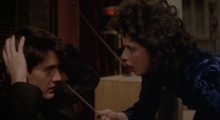
Second #2350, 39:10 1. Dorothy, the knife dangerously close to Jeffrey’s nose, perhaps unintentionally recalling the infamous nose-slicing moment in Roman Polanski’s Chinatown. 2. Has Jeffrey caused her to act like this, or has Frank? Jeffrey is not Frank, although Dorothy treats him like she might were she to find him hiding, unarmed, in her closet. 3. In the fevered dream of Blue Velvet, what causes what is impossible to untangle, as if concepts like “before” and “after” don’t mean a thing. 4. In Steve Erickson’s novel Zeroville, Vikar—who becomes an editor not just of film but of a version […]
by Nicholas Rombes on Dec 5, 2011 -
The Blue Velvet Project, #49
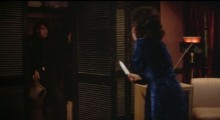
Second #2303, 38:23 In Roberto Bolaño newly published story “The Colonel’s Son,” the narrator describes a zombie movie he’s recently seen on TV. In fact, the entire story is a sordid summary of the movie, introduced like this: I swear it was the most democratic, the most revolutionary film I’d seen in ages, and I don’t say that because the film in itself revolutionized anything; not at all, it was pathetic really, full of clichés and tired devices, yet every frame was infused with and gave off a revolutionary atmosphere . . . At the moment of this frame, second […]
by Nicholas Rombes on Dec 2, 2011 -
The Blue Velvet Project, #48
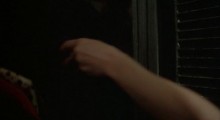
Second #2256, 37:36 When not to look? A fragment: Dorothy’s arm, reaching into the closet where Jeffrey hides, to fetch the blue velvet gown in preparation for Frank’s arrival. A confession: I’ve never watched—completely watched—this upcoming section of the film, out of sheer fear of what I can hear unfolding on the screen. Or if I have watched it, I have done so using the Travis Bickle method. What is it that we need to protect ourselves from in the most brutal moments of Blue Velvet? In an interview with the writer Ben Marcus, Brian Evenson said that to render […]
by Nicholas Rombes on Nov 30, 2011 -
The Blue Velvet Project, #47
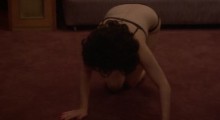
Second #2209, 36:49 The seconds tick down. Dorothy crawls, in anguish across the floor, coming dangerously close to the closet that hides Jeffrey. She is abject, and also strangely free, the sort of freedom that comes from knowing that the worst is yet to happen, yet again. The sharp expectation of pain that gives life meaning, but that can also carve out what was best in you and wound and warp it forever. It is like a scene from a silent movie, as Dorothy’s body conveys a meaning beyond words. Isabella Rossellini is the star of a hidden drama within […]
by Nicholas Rombes on Nov 28, 2011 -
The Blue Velvet Project, #46
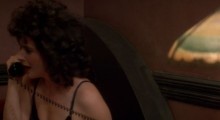
Second #2162, 36:02 “Frank? Frank! What’s the matter with him?” Dorothy pleads on the phone about her kidnapped husband and son, Don and “little Donny.” There are facts, and there are facts of the frame: 1. This shot of Dorothy completely breaks with Jeffrey’s implied point-of view from the closet. 2. Dorothy is a woman in trouble. 3. This is the first instance of Frank in the film, invisible over the phone line, somewhere else, an implied presence and absence at the same time. 4. Dorothy’s maternal vulnerability, the fact of it, and the way that Jeffrey will sense and […]
by Nicholas Rombes on Nov 23, 2011 -
The Blue Velvet Project, #45
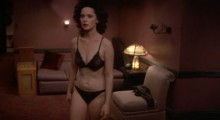
Second #2115, 35:15 Jeffrey, startled by Dorothy’s return, hides in the closet. She undresses, and comes toward the closet and, just as Jeffrey is about to be discovered, the phone rings. It has not rung yet at the moment of this frame, which captures Jeffrey’s fantasy-dream at its edges: what are the chances that the woman of his dreams would strip to her underwear and approach him? The angle of vision is not directly from Jeffrey’s point of view, slightly dissociating us from his gaze. But that phone ring, as if dialed in from the stock sounds of classic Hollywood […]
by Nicholas Rombes on Nov 21, 2011 -
The Blue Velvet Project, #44

Second #2068, 34:28 “I hope you’re careful, Jeffrey,” Sandy whispers to herself, gazing up at Dorothy’s apartment, where Jeffrey has just not-heard her car horn warning because—and there is a strange, haunted reference to Psycho somewhere in this scene—he is in Dorothy’s bathroom and has just flushed the toilet. Laura Dern’s face is made-up in a way that hearkens back to her role in 1982’s Ladies and Gentlemen the Fabulous Stains, a film which teetered so delicately between the sweet danger of punk and the even sweeter danger of new wave pop that it practically imploded. Lines upon lines could […]
by Nicholas Rombes on Nov 18, 2011
